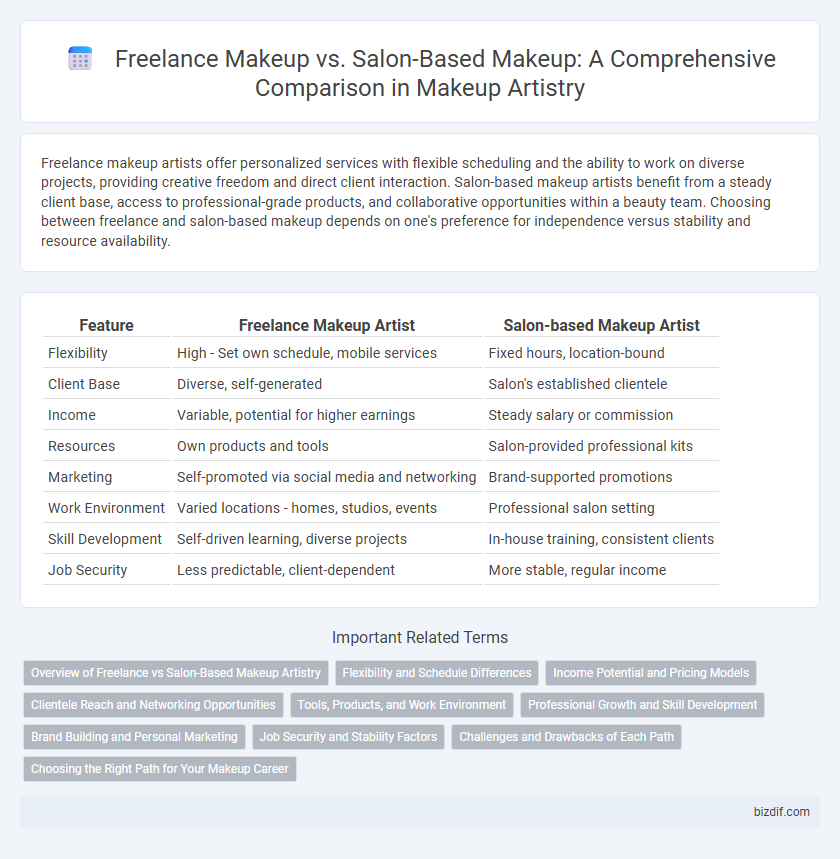Freelance makeup artists offer personalized services with flexible scheduling and the ability to work on diverse projects, providing creative freedom and direct client interaction. Salon-based makeup artists benefit from a steady client base, access to professional-grade products, and collaborative opportunities within a beauty team. Choosing between freelance and salon-based makeup depends on one's preference for independence versus stability and resource availability.
Table of Comparison
| Feature | Freelance Makeup Artist | Salon-based Makeup Artist |
|---|---|---|
| Flexibility | High - Set own schedule, mobile services | Fixed hours, location-bound |
| Client Base | Diverse, self-generated | Salon's established clientele |
| Income | Variable, potential for higher earnings | Steady salary or commission |
| Resources | Own products and tools | Salon-provided professional kits |
| Marketing | Self-promoted via social media and networking | Brand-supported promotions |
| Work Environment | Varied locations - homes, studios, events | Professional salon setting |
| Skill Development | Self-driven learning, diverse projects | In-house training, consistent clients |
| Job Security | Less predictable, client-dependent | More stable, regular income |
Overview of Freelance vs Salon-Based Makeup Artistry
Freelance makeup artistry offers flexibility and the opportunity to build a diverse client base by working in various locations, while salon-based makeup artists benefit from a steady clientele and access to professional-grade products and equipment. Freelancers must manage their own scheduling, marketing, and supply acquisition, contrasting with salon artists who often receive administrative and promotional support. The choice between the two depends on individual preferences for independence versus stability, as well as career growth and income potential within the makeup industry.
Flexibility and Schedule Differences
Freelance makeup artists enjoy greater flexibility in setting their own schedules and choosing diverse locations, enabling personalized client experiences and varied work environments. Salon-based makeup professionals typically adhere to fixed hours and structured appointments, providing consistent income but limited freedom in timing. Understanding these schedule differences helps makeup artists align their career paths with personal lifestyle preferences and work routine demands.
Income Potential and Pricing Models
Freelance makeup artists often enjoy higher income potential by setting personalized pricing and catering to diverse clients, including weddings, photoshoots, and special events. Salon-based makeup artists typically follow fixed pricing models dictated by the salon, which can limit earning capacity but offer steady client flow and job stability. Freelancers benefit from flexible pricing strategies such as package deals and hourly rates that adapt to market demand, while salon artists depend on commission or hourly wages tied to salon policies.
Clientele Reach and Networking Opportunities
Freelance makeup artists often access a broader clientele reach by offering personalized services at diverse locations, which enhances flexibility and client diversity. Salon-based makeup artists benefit from steady walk-in traffic and established customer bases, enabling consistent exposure to repeat clients. Networking opportunities for freelancers grow through industry events and social media platforms, while salon artists capitalize on in-house collaborations and referrals within the salon community.
Tools, Products, and Work Environment
Freelance makeup artists often curate versatile kits with portable, multi-use tools and travel-friendly products tailored for diverse client needs, enabling flexibility in various settings. Salon-based makeup professionals typically access a broader range of high-end, specialty products and specialized equipment within a controlled, hygienic work environment with established lighting and sanitation protocols. The work environment impacts efficiency; freelancers adapt to varying spaces, whereas salon artists benefit from consistent, professional setups designed for makeup services.
Professional Growth and Skill Development
Freelance makeup artists experience rapid professional growth through diverse client interactions and varied project types, enhancing adaptability and creativity. Salon-based makeup artists benefit from structured training programs and consistent feedback from experienced colleagues, fostering skill refinement and specialization. Both paths offer unique opportunities, with freelancing promoting entrepreneurial skills and salons providing a collaborative learning environment.
Brand Building and Personal Marketing
Freelance makeup artists build their brand through personalized marketing strategies, leveraging social media platforms and client testimonials to cultivate a unique identity and loyal clientele. Salon-based makeup artists benefit from the salon's established reputation and steady foot traffic but have limited control over personal branding and marketing efforts. Effective personal marketing for freelancers includes creating professional portfolios, engaging in local events, and collaborating with photographers to enhance visibility and differentiation in the competitive beauty industry.
Job Security and Stability Factors
Freelance makeup artists often face fluctuating income and client availability, which can impact job security due to the lack of a steady employer. Salon-based makeup professionals benefit from consistent appointments and a fixed salary, providing greater financial stability and access to employee benefits. However, freelancing offers flexibility and diverse clientele but requires strong self-marketing skills to maintain long-term stability.
Challenges and Drawbacks of Each Path
Freelance makeup artists face challenges in securing consistent clients, managing their own marketing, and investing in portable, high-quality tools while working irregular hours without steady income. Salon-based makeup artists benefit from a built-in clientele and professional environment but often deal with limited creative freedom, lower individual earnings due to commission splits, and rigid working schedules. Both paths require resilience to navigate fluctuating demand and maintaining up-to-date skills amidst evolving beauty trends.
Choosing the Right Path for Your Makeup Career
Freelance makeup artists enjoy flexibility, diverse client opportunities, and the potential for higher income through personalized branding, while salon-based professionals benefit from steady clientele, access to professional equipment, and collaborative work environments. Evaluating factors such as work-life balance, income stability, and personal career goals is crucial when deciding between freelance and salon makeup artistry. Building a strong portfolio and networking within the beauty industry enhances success regardless of the chosen path.
Freelance makeup vs Salon-based makeup Infographic

 bizdif.com
bizdif.com